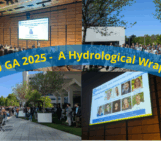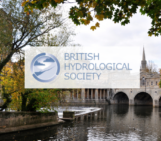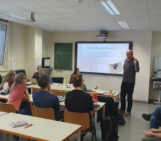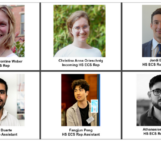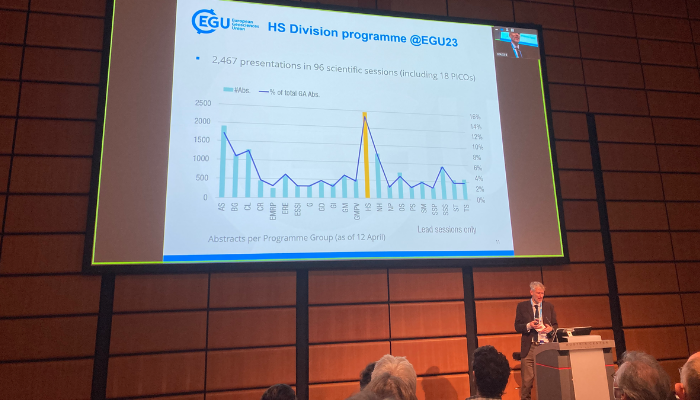
Summarising such a week is almost an impossible task. First, it is worth highlighting that, on-site, we were back to a format with oral presentations, PICOs, and posters. Virtual participants could join the oral sessions and the PICO pitches via Zoom. Virtual boards were also available for the online poster sessions and PICOs.
The format of 10-min oral presentations (questions included) was a challenge and participants had shared feelings about it: some found it too short, others liked it as it gives more participants a chance to have a talk in an oral session.
The participation for virtual poster and PICO presenters via GatherTown worked pretty well but was not yet optimal for on-site participants because the access to GatherTown requires a PC or a tablet, which not everyone carries along on conference days. We will see how this joint on-site / virtual format will evolve.
During the EGU General Assembly, the HS division presented its awards and medals: the Division Outstanding Early Career Scientist Award went to Inge de Graaf, the Henry Darcy medal, to Marc Bierkens and the John Dalton medal, to Taikan Oki. The work of all three awardees currently evolves around large scale to global modelling, which underlines the importance of and the progress made in this field in recent years. Furthermore, the awards for Outstanding Student Posters and Presentations (OSPP) were presented to 10 new division awardees of the 2022 OSPP Award competition.
Perhaps the most important event during this EGU-GA was the official handing over of the HS chair from Maria-Helena Ramos to Alberto Viglione during the HS Division meeting. Thanks Helena, for having navigated us through this extremely complicated period that went from a chat-only virtual format in 2020, to a Zoom version in 2021, an on-site variation without posters in 2022, and finally back to new normal in 2023 (online and virtual).
And a big welcome to Alberto! He just won the Natural Hazards Plinius medal 2023 – you can learn more about his work in this blog post of the Natural Hazards (NH) Division.
The General Assembly was also a big week for early career scientists (ECS) in the Hydrological Sciences division. A networking event on Tuesday offered a wonderful opportunity for ECS to connect, including with representatives from the Young Hydrologic Society (YHS). On Tuesday evening, many also attended an EGU-wide ECS reception and connected with numerous colleagues from other divisions.
Finally, Friday saw the official handover event of ECS representative duties. After two years of amazing work, Elena Cristiano handed her mantle over to Christina Orieschnig, who’ll be supporting HS’ main ECS rep, Florentine Weber, over the coming year. More than that, HS’ ECS team is growing. Young hydrologists will now have an entire team of motivated peers to represent their division on social media and the EGU blog.
A final word: provide feedback to the organizers!
On-site participants were overall very happy with the meeting, its scientific content and the networking opportunities it offered during all the week. We hope that the meeting was also successful for the virtual participants, which corresponded to about 18% of the total registered participants.
The Programme Committee is now inviting all participants to provide feedback by filling in the EGU feedback form. Take some time and let them know about your experience and any suggestions for the next General Assembly!
We hope to see you all at EGU24, from 14 to 19 April 2024 in Vienna, Austria, and Online!




